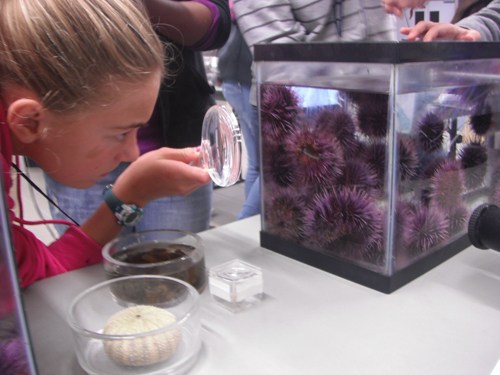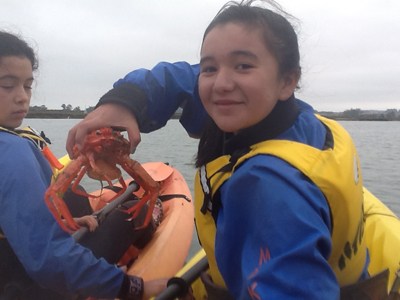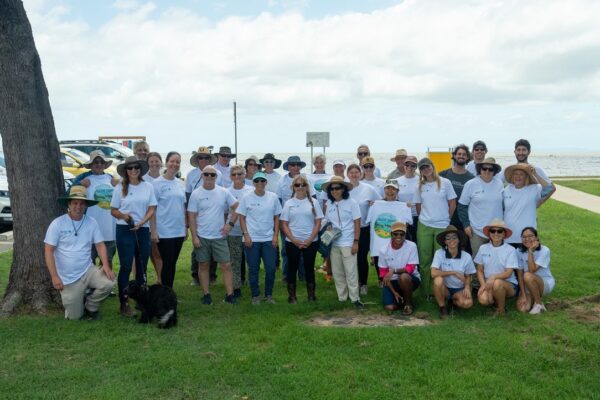In part 3 of our blog series on past Small Grants projects at zoos and aquariums, Dolores Toledo of Monterey Bay Aquarium shares what they've learned about helping young women from diverse backgrounds become confident, science-capable, and personally active in conservation.
Background
Monterey Bay Aquarium’s Young Women in Science (YWS) program began in 1999. Each summer we offer three, week-long, bilingual YWS camps. The camps provide young women entering grades 7-8 with extracurricular, hands-on science experiences and introduce them to women in the science field. The goal is to provide these girls with opportunities that foster their curiosity and sense of wonder, as well as bolster their self-image of being science-capable. Young women who live in Monterey, Santa Cruz, and San Benito counties are eligible to apply.
YWS was created to motivate more girls to pursue science careers and feel science savvy. Today, studies show that while more females are making their way in the science fields, minority women are still falling short. Over the years YWS has strengthened our recruitment of low income and Hispanic young women who typically do not visit the Aquarium or pursue careers in science. Now more than ever, we ensure the program is conducted bilingually in English and Spanish to reach the underrepresented local Hispanic audience. 
Every summer more than 70 middle school girls participate in the two first-year camps “Otter Mystery.” Through their experiences, participants identify and connect the factors that influence the health of the threatened Southern sea otter population. The girls have the opportunity to observe sea otters while kayaking in Elkhorn Slough, use telemetry to track wild sea otters, go sand crab monitoring and surface scuba diving, among other activities.
Making conservation personal
In addition, 40 girls have the opportunity to return for a second year of camp-- “Ocean Guardians.” In this camp, participants are challenged to rethink their ideas about single-use plastic and learn about threats plastic can cause to marine species and to the local community. At the end of the week students create a Public Service Announcement to encourage others to become Ocean Guardians. This year, we are increasing the science content by including activities on bioaccumulation and plastic toxicity and including a conservation action, where students will rally the community to sign a pledge to SAY NO to disposable plastics.
The Monterey Bay Aquarium’s Young Women in Science program engages middle school girls in real, hands-on science in a friendly, supportive context. Female role models support their learning about the science process. Girls interact with science professionals, learn about the kinds of activities that scientists do, and the preparation they need in order to become a scientist. The ultimate vision is to give them positive science experiences that will keep them interested in science throughout their high school years.
Goals of the program
At the same time, we know not all girls will be attracted to science careers. We hope that they will feel self-empowered to pursue higher degrees and feel capable of making life and consumer decisions that may involve understanding science information.
Our overall goals:
- Empower low income and Hispanic young women participants to engage in science.
- Help students feel inspired, confident, ocean literate and ready to act on behalf of the ocean.
- Increase their awareness of conservation and their personal role in conservation.
- Introduce participants to community partners and opportunities that support their involvement in science.
- Understand how events in nature can be explained by science.
Throughout the camps, the young women discuss what they know about conservation practices and how they put those practices. Most are familiar with recycling and reusing, but this year, we are introducing them to the idea of refusing. The goal is that participants will continue practicing these actions at home, school and in their community after the program ends. In addition, all curriculum is woven with conservation themes of habitat conservation and ecosystem interconnectedness.
The program is staffed by science educators from the Monterey Bay Aquarium. Women scientists from various fields share their work and mentor young women during the weeks. Middle school science teachers also participate as staff, serving to foster the student-teacher that relationship. Recently, some of our YWS alumni have been hired as paid Program Assistants for Young Women in Science. These college students are excellent and inspirational role models for our girls and for us.
-- Dolores Toledo, Bilingual Education Specialist at Monterey Bay Aquarium





